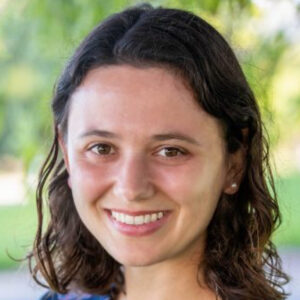
Olivia Ashmoore
Policy Analyst, Energy Innovation Policy and Technology, LLC

Rachel Goldstein
Modeling Manager, Energy Innovation Policy and Technology, LLC
Seminar Information:
Date: October 18, 2023
Time: 1:00 pm to 2:00 pm MDT
Location: Held via Webex. A no-cost registration is required to attend.
Register here or contact [email protected] for assistance.
The I-WEST seminar series hosts thought leaders on a spectrum of topics tied to transitioning the Intermountain West to carbon neutrality, including technologies, policy, workforce, and environmental justice.
Seminar Summary
Energy transition is presenting the Intermountain West with many opportunities that could potentially affect the entire regional energy system, as well as local economies and communities. Projects that seek to reduce greenhouse gas emissions in one energy sector will likely impact jobs, natural resources, infrastructure, and revenues in another sector. With so many complexities to consider, data is needed to help policymakers and everyday energy consumers alike make science-informed decisions. Moreover, advanced tools are needed to help us visualize the data and what they mean in the real world.
This seminar will introduce just such a tool. The Energy Policy Simulator is a free, open-source tool to evaluate energy-related policies and visualize impacts on cash flow, job growth, emissions, power plants, and more. Energy Innovation and the Rocky Mountain Institute developed U.S. state Energy Policy Simulators (EPS) for the contiguous 48 states, providing information on a wide range of state policies and their combined impact on greenhouse gas emissions, public health, employment, and the economy.
Tune in to learn about the EPS’s underlying methodology, how it can be used to evaluate climate and energy policies, and how it has been used to advance state climate action.
Speakers
Olivia Ashmoore is a Policy Analyst at Energy Innovation, focused on the Modeling and Analysis Program. She provides research and analysis to support the firm’s climate policy modeling and led development of the state level models in the Energy Policy Simulator (EPS). Olivia holds a B.A. from Oberlin College in environmental studies and a Master of Public Policy from the Goldman School of Public Policy at the University of California, Berkeley.
Rachel Goldstein is a Research and Modeling Manager at Energy Innovation, focused on the firm’s Modeling and Analysis Program, where she oversees energy policy research projects and collaborates with external partners and decision-makers to identify decarbonization opportunities. Rachel holds a B.A. in environmental biology and environmental engineering from Washington University in St. Louis and an M.S. in energy policy and climate science from Johns Hopkins University.


